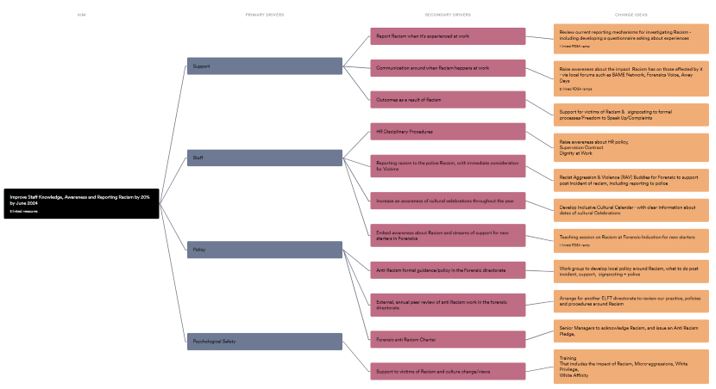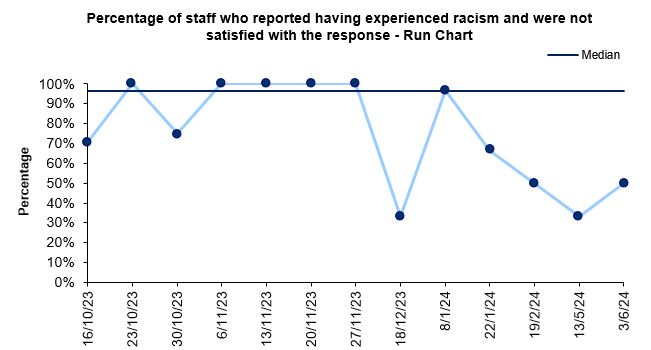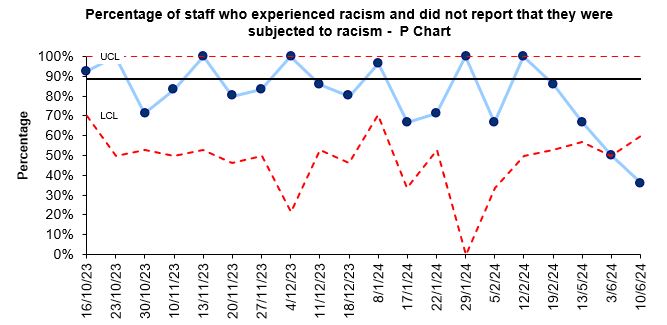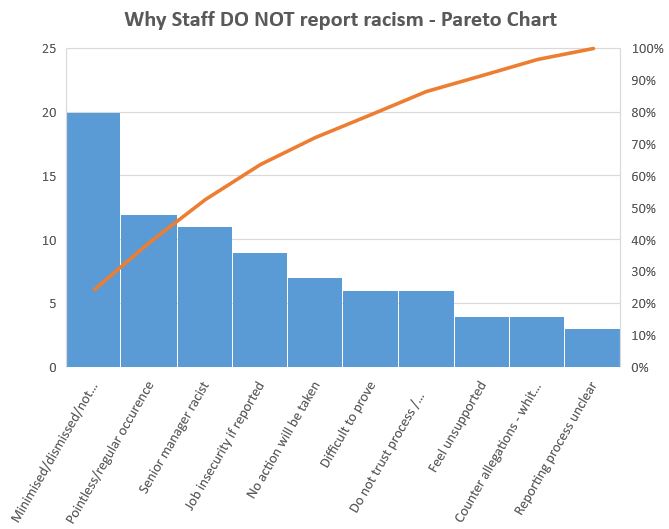
Racial Equity in the Forensic Service
25th June 2024
By Mayuri Parmar, QI Coach
The key commitment of the NHS is to provide a service that contributes to the health and wellbeing of all that use it, which also relates to the emotional wellbeing of NHS Staff. Nevertheless, the NHS and specifically, the Forensic Service continues to face challenges in prioritising staff wellbeing leading to the creation of the Staff-on-Staff Anti-Racism Quality Improvement Project. The project team’s journey began with a sobering realisation: racism persists within our workplace with, for example, reports from employees detailing incidents of racism that have left them feeling unsupported but also deeply affecting their mental health and wellbeing, that also impacts on patient care and outcomes. A comprehensive staff survey confirmed the urgency of addressing these issues head-on. It was clear that action was necessary to create a workplace where every staff member feels safe, valued, and respected.
In response to these challenges, the antiracism project team was formed and tested several change ideas aimed at fostering a more inclusive and supportive environment with the main aim of the project focusing on reporting racism.
 Photo 1. QI project team members. From top left to bottom right: Emma Furlong, Mayuri Parmar, Nafeesah Aumeerally, Ademola Adekoya, Cornelia Kundishora, Gvette Shillingford and Gqwetha Malinga
Photo 1. QI project team members. From top left to bottom right: Emma Furlong, Mayuri Parmar, Nafeesah Aumeerally, Ademola Adekoya, Cornelia Kundishora, Gvette Shillingford and Gqwetha Malinga
One impactful change idea, as seen on Figure 1, relates to the forensic induction programme where new staff members are introduced to the project, provided with guides on reporting racism and made aware of the service’s commitment to combating racism from day one, thereby empowering new starters to contribute to and benefit from our supportive culture by “calling it out” with the Motto “Once is too much!”. The feedback forms have been invaluable as they confirm the affirmative need for staff to feel supported from their first day at work.
 Figure 1. Driver diagram with change ideas on the right
Figure 1. Driver diagram with change ideas on the right
A critical milestone is the establishment of elft.ForensicAntiRacism@nhs.net, a dedicated email manned by the antiracism QI project team. This platform provides a confidential space for staff to report incidents, seek guidance, and access support promptly and sensitively. On a positive note, staff are now using the email for reporting and guidance.
Collaborative engagement is also key to equitable practices: Change ideas have included various platforms and events, such as IHI session, academic meetings, and Trust-wide forums being utilised to raise awareness, share information about the project work, and learn from others in the process.
Guidance and support from diverse staff and external stakeholders have been invaluable as has the keen eye of the QI Coaches and sponsor. Their expertise and commitment have been instrumental in shaping the QI project strategies and ensuring their effectiveness in tackling racism within the Forensic Directorate. The unwavering support of the Directorate Management Team’s commitment to combating racism is reflected in their unanimous pledge against racism, another change idea taken “to the top”.
Figure 2. P chart showing percentage of staff who experience racism and did not report
Figure 2 shows an interesting picture as the percentage of staff that did not report racism is high with the mean at 88.6%. Of those that did report racism, over 90% of staff were NOT satisfied with the response as seen in Figure 3. The data also demonstrates the need for access to key staff that do not use computers on wards, for example, and therefore have been unable to complete the online survey. It can be highlighted that on August 1, 2024, 97% of staff that responded were NOT satisfied with the response to their reports of racism. This is particularly noteworthy because hard copies of the surveys were provided to ward staff on this week. Lastly, themes were collated from the survey responses, as shown in Figure 4, that staff members are unhappy with the reporting process and fear reprisals because of reporting racism.
 Figure 3. Run chart showing percentage of staff who were not satisfied with the response when they reported racism
Figure 3. Run chart showing percentage of staff who were not satisfied with the response when they reported racism
Therefore, the aim of the project to improve staff knowledge, awareness and reporting of racism by 20%, although a simple aim, and if successful through change ideas, will produce a substantial difference in the wellbeing of staff subjected to racism.
Figure 4. Pareto Chart identifies top reasons why staff do not report racism
So what is next? The change ideas have been varied and plentiful and using the matrix have been prioritised. For example, a local flow chart on reporting racism and support mechanisms has been created and is awaiting approval. In addition, RAV (Racist Aggression & Violence) buddies will be requested by the group. Scaling up previous projects is a way forward, and the group will be devising a Ten Point Action Plan, for staff only, which was successful in the East India Racism Project.
The project team will attend Team Away Days, consultants’ meetings and actively engage with staff through close collaboration with the Forensic RACE Group raising further awareness and guidance on reporting racism. It is noticeable from the chart above the staff have not reported harassment and bullying with regard to their protected characteristics and the emphasis will be on improving the rate of reporting.
Psychological safety has been a paramount consideration for the project group working through an emotive and often triggering subject. Therefore, appropriate training for the group has been identified and which they will attend this year. This is not a project that ends, but rather will continue with embedded change ideas that have shown a positive impact on staff wellbeing.
The QI project team writes, “The Staff-on-Staff Anti-Racism QI Project is a testament to our collective determination to eradicate racism within the Forensic Directorate. Moving forward, we remain dedicated to evaluating and refining our strategies to ensure their effectiveness and relevance. Our journey towards a workplace where diversity is celebrated and every individual feels empowered to thrive is ongoing and non-negotiable.
Our mission goes beyond organisational compliance; it is about fostering a culture where inclusivity and respect are non-negotiable principles. Through the Staff-on-Staff Anti-Racism QI Project, we are reshaping the Forensic Directorate into a place where all staff members can excel, free from the scourge of racism. Together, we are making strides towards a future where diversity is our strength, and every voice is heard and valued”.
Most Read Stories
-
Why is Quality Control important?
18th July 2018

-
An Illustrated Guide to Quality Improvement
20th May 2019

-
2016 QI Conference Poster Presentations
22nd March 2016
-
Recognising Racism: Using QI to Help Take Action
21st January 2021

-
Using data enabled us to understand our problem
31st March 2023

-
QI Essentials: What does a Chief Quality Officer do?
18th March 2019


Follow QI on social media
To keep up to date on the latest concerning QI at ELFT, follow us on our socials.




